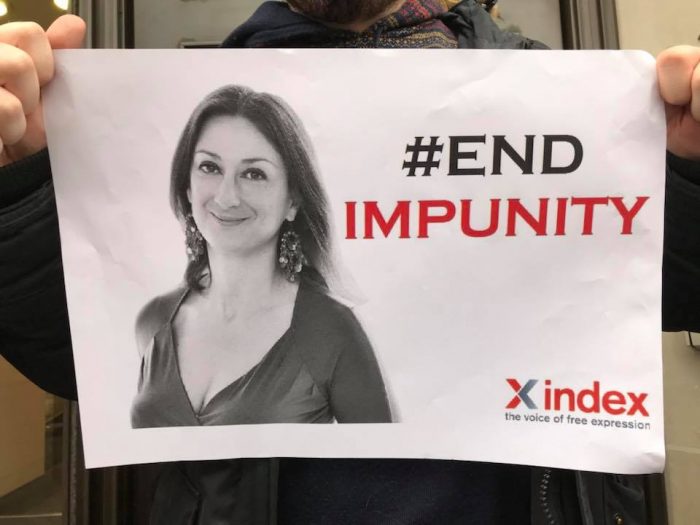[vc_row][vc_column][vc_column_text]
Journalists who dare to investigate powerful people or companies are facing increasingly expensive legal threats to stop them publishing.
Daphne Caruana Galizia, the Maltese investigative journalist who was assassinated in October 2017, was just one reporter who fought against these lawsuits. Strategic Litigation Against Public Participation (Slapp) lawsuits are not new nor are they limited to the media world, but they are incredibly powerful.
Daphne’s son Paul said: “Slapp lawsuits are designed to remove the truth from circulation by making it too expensive to assert. Malta’s political and business elite used them extensively against my mother Daphne Caruana Galizia who always stood her ground but, as an independent journalist, paid a heavy price in terms of stress, time wasted and money spent on her own defence.”
Leading freedom of expression advocates are worried about the power of these lawsuits and the way they are being used to stop publications.
Jodie Ginsberg, CEO of Index, said: “Having a media that is free to investigate corruption and abuse of power – and free to publish the results of those investigations – is fundamental to democracy. These vexatious lawsuits – deliberately aimed at preventing journalists from carrying out such work – must be stopped.”
Jonathan Price, a barrister with Doughty Street Chambers, said: “Media plurality and diversity are essential to a functioning democracy. But bloggers, citizen journalists, small-scale specialist publications and NGOs are most vulnerable to Slapp activity. A large corporate entity or wealthy individual is able to outspend and out-resource these independent media outlets well before any substantive court decision as to the merits of a particular case. All parties are aware of this inequality of arms, and just that simple awareness is enough to deter many small publishers from investigating and reporting on large corporates and wealthy individuals.
He added: “So there is the visible, practical censorship that is achieved by tying media organisations (of all sizes) up in spending time and money on possibly baseless litigation. And there is the self-censorship applied by the smaller publishers so as to avoid the dread of receiving a lengthy, highly aggressive letter from expensive libel lawyers.”[/vc_column_text][/vc_column][/vc_row][vc_row][vc_column][vc_column_text]A small Maltese news outlet, The Shift News, is fighting against Slapps and campaigning for legal changes in Malta to give more protection to journalists covering public interest stories. Opposition MPs in Malta are seeking to use a private member’s bill to change the law to stop international lawsuits being used to prevent Maltese journalists covering stories.
This comes after The Shift News was threatened with a lawsuit for an article about the alleged involvement in a scandal by the company Henley and Partners, which has been awarded a multi-million dollar contract to act as agent for a scheme through which Malta makes European citizenship available. Henley and Partners threatened legal action against The Shift in the UK and the US unless an article about the company’s alleged involvement in a passports-for-cash scandal in Grenada was removed. Henley and Partners deny any wrongdoing. The Shift News refused and instead published the threatening letter.
These kind of lawsuits are a problem in other countries too. For example, Albanian investigative journalists Besar Likmeta and Aleksandra Bogdani were sued for defamation by an influential judge and his wife. The journalists work for reporter.al, an investigative reporters’ platform in the Albanian language.
Fighting such lawsuits is extremely expensive – far too much for all but the largest media outlets. The result is censorship doled out by those with money: news and articles fail to appear, without anyone realising what has happened. Journalists are even told they must not mention these lawsuits or they will face further legal action.
A cross-party group of MEPs are now calling for new EU legislation to deter such lawsuits. “We are committed to the protection of investigative journalists and media freedom across the EU and will pursue this issue until Anti-Slapp EU legislation is in place,” they said.
Flutura Kusari, legal advisor to the European Centre for Press and Media Freedom, said that “in a Slapp lawsuit, the plaintiff does not aim to win a case, rather than to intimidate and discourage reporters from further reporting by placing them in long and costly judicial processes”.
There are some signs that the European Parliament is worried about the problem in a damning report recently published after a delegation of MEPs visited Malta. It identified many failings, including concerns about the effectiveness of the fight against corruption, with few investigations resulting in criminal prosecutions, and the weak implementation of anti-money laundering legislation. “The brutal assassination of Daphne Caruana Galizia was aimed at instilling fear in everyone, especially those involved in investigating and prosecuting cases of money laundering and corruption,” it said.
This is not just a problem in Europe, but in the USA there is some protection for journalists against vexatious legal actions. According to the Reporters Committee for Freedom of the Press, some US states, including California, Georgia and Texas, have laws that discourage lawsuits.
The use of expensive lawsuits to stop journalists reporting a story with a strong public interest is not a new tactic, but we must redress the balance against media investigations.
Joy Hyvarinen is head of advocacy at Index on Censorship[/vc_column_text][/vc_column][/vc_row][vc_row][vc_column][vc_basic_grid post_type=”post” max_items=”4″ element_width=”6″ grid_id=”vc_gid:1516373343229-cbca273b-69ee-8″ taxonomies=”18782″][/vc_column][/vc_row]




